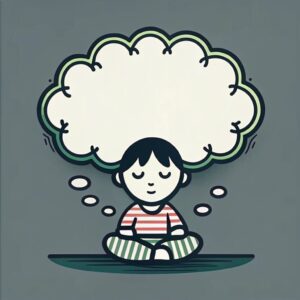Question More, Action Knowledge.
Remember, at QMAK, we don’t just teach; we empower. We don’t just inform; we inspire. We don’t just question; we act. Become a Gold Member, and let’s unlock your child’s full potential, one question at a time.
Back to Mind Explorers
![]()
This series of games helps children develop a deeper understanding of the nature of their own awareness and the way their experiences arise within it.
By exploring the relationships between various aspects of their experience (such as sounds, sights, thoughts, and feelings) and the “background” or “container” in which they appear, children can begin to cultivate a more spacious and flexible perspective on their own minds and the world around them.
This practice encourages a shift from identifying with the contents of awareness (the “foreground” experiences) to recognizing the awareness itself (the “background” in which these experiences arise). By learning to see thoughts, emotions, and sensations as temporary appearances within a larger field of awareness, children can develop greater resilience, adaptability, and emotional regulation skills.
Hey there, young explorer!
Today, we're going on a special adventure called "The Awareness Treasure Hunt."
We'll be looking at different aspects of our experience, like sounds, sights, thoughts, and feelings, and asking ourselves a big question:
"What is this happening in?"
It's like we're trying to find the treasure chest that holds all these experiences.
Along the way, we'll play some fun games that will help us discover new ways of looking at the world around us and inside our minds.
Are you ready to join the hunt?
Guide the child through each of the following games, encouraging them to approach the experiences with a sense of curiosity and playfulness, rather than trying to figure out the “right” answer.
Game 1: The Sounds of Silence

Game 2: The Movie Screen of My Mind

Game 3: The Empty Mind

Game 4: Body in Spaciousness

Game 5: Big I and Little Me

Game 6: Time and Now

To further explore the concept of awareness and the way our experiences arise within it, consider introducing your child to the book “Mindful Monkey, Happy Panda” by Lauren Alderfer.
This charming story follows the journey of a monkey named Monkey Mind, who is always busy with thoughts and worries, and his friend Happy Panda, who teaches him how to find peace and happiness through mindfulness.
1. Who are the two main characters in the book?
a) Elephant and Giraffe
b) Monkey and Panda
c) Lion and Tiger
d) Rabbit and Fox
2. What is Monkey’s main problem in the story?
a) He can’t find food
b) He’s always sleepy
c) His mind is very busy
d) He can’t climb trees
3. How does Panda appear to Monkey?
a) Grumpy and mean
b) Silly and playful
c) Calm and happy
d) Loud and energetic
4. What does Monkey want to learn from Panda?
a) How to eat bamboo
b) How to be so calm and happy
c) How to climb higher
d) How to make friends
5. What does Panda teach Monkey about?
a) Yoga
b) Mindfulness
c) Martial arts
d) Cooking
6. What does Panda say about thoughts?
a) We should ignore all thoughts
b) Thoughts are bad
c) We can notice thoughts without getting caught up in them
d) We should only have happy thoughts
7. What does Panda compare the mind to?
a) A quiet lake
b) A stormy sea
c) A blue sky with passing clouds
d) A dark cave
8. What activity does Panda suggest to help Monkey be more mindful?
a) Jumping up and down
b) Talking all the time
c) Focusing on his breath
d) Sleeping more
9. How does Monkey feel after practicing mindfulness?
a) More stressed
b) More tired
c) More calm and focused
d) More hungry
10. What is the main lesson of the book?
a) Monkeys are better than pandas
b) Being busy all the time is good
c) Mindfulness can help us feel calmer and happier
d) We should ignore our thoughts and feelings
1. b) Monkey and Panda
2. c) His mind is very busy
3. c) Calm and happy
4. b) How to be so calm and happy
5. b) Mindfulness
6. c) We can notice thoughts without getting caught up in them
7. c) A blue sky with passing clouds
8. c) Focusing on his breath
9. c) More calm and focused
10. c) Mindfulness can help us feel calmer and happier
Verse 1:
Sounds in silence, thoughts on a screen
Feelings and sights, what does it all mean?
We’re on a hunt for a special treasure
In a space beyond any measure
Pre-Chorus:
Where does it all happen, can you see?
In a place that’s bigger than you and me
Chorus:
We’re on an Awareness Treasure Hunt
Looking for the space where all things come
Sounds and sights, thoughts and dreams
All happen in awareness, or so it seems
Verse 2:
Empty minds and spacious bodies
Big I and little me, quite a story
Time flows by in an endless now
We’re exploring awareness, come learn how
(Pre-Chorus)
(Chorus)
Bridge:
It’s not about finding answers, you see
But playing with questions curiously
In this game of discovery so grand
We’re learning more about where we stand
(Chorus)
Outro:
Open your eyes, what do you know?
You’re the treasure chest where all things go
In awareness vast, like the open sky
We find the magic of you and I
Remember, at QMAK, we don’t just teach; we empower. We don’t just inform; we inspire. We don’t just question; we act. Become a Gold Member, and let’s unlock your child’s full potential, one question at a time.